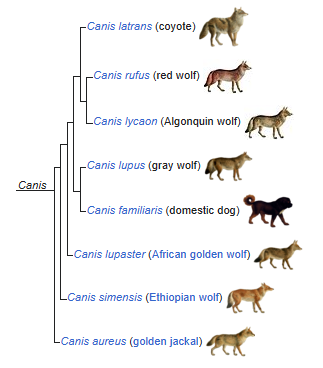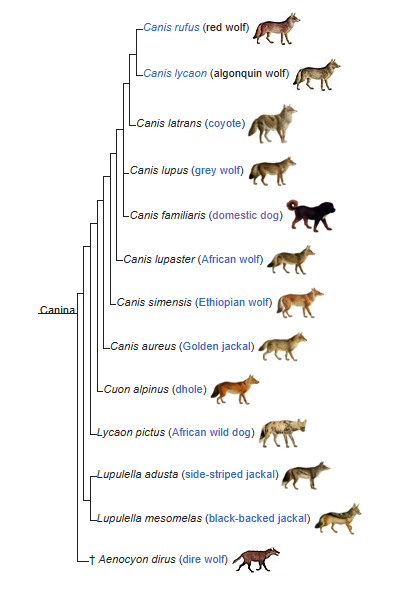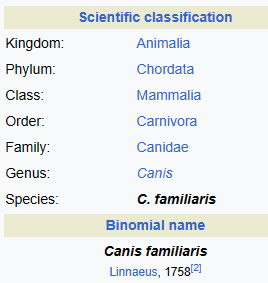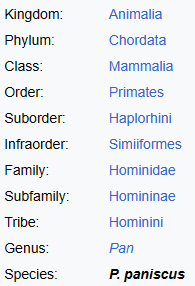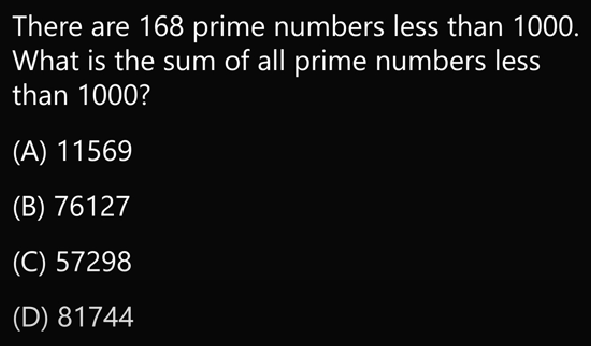-
Posts
5401 -
Joined
-
Days Won
52
Content Type
Profiles
Forums
Events
Everything posted by Genady
-

OceanGate Submersible Goes Missing During Titanic Dive
Genady replied to toucana's topic in Engineering
This would increase rather than decrease the submersible's buoyancy, wouldn't it? -

OceanGate Submersible Goes Missing During Titanic Dive
Genady replied to toucana's topic in Engineering
How often the CEO was piloting the submersible? Did he do it this time to show how much he trusts its safety? -
A biological classification of a taxon does not put it at the head of a chain of 'trickle down' classifications, i.e., it does not aim to answer, what the taxon contains, but rather, where the taxon is in the "tree of life". Continuing with the dog example, the biological classification of the species, C. familiaris, does not have it on top, like this: but rather has it on the bottom, like this: or like this: and so on. The difference is what is meant by "to classify" something: to "classify a set" is to analyze its contents, while to "classify a taxon" is to show its relations to other taxa.
-
But this category is not related to evolutionary biology. It rather seems medical. There are many other classifications, e.g., by breeders, by competitions. They are irrelevant in this thread.
-
For such reasons, scientific classifications of organisms are not arbitrary, but are developed via many studies and research, discussions, consideration of variety of factors, adjustments, etc. They are also not rigid, but are adjusted when new results, factors, etc. are discovered. In no scientific classification of dogs, for example, number of legs, tail, hair, etc. are found. Here it is: Dog - Wikipedia
-
In the 15 years since this thread was inactive good explanations have been added, for example, in youtube:
-
How do you think such a link works in other languages? E.g., in Russian the word for biological extinction has nothing to do with the word for extinguishing. Same in Hebrew.
-
-
Square roots, yes. Exponents, only in a limited way.
-
Correct, and glad you liked it. +1
-
I see. I didn't refer to definitions of words, specifically, the word "extinct". I only referred to how it is used in biology, more specifically, in the study of biological evolution. I don't know, how its uses in other sciences relate to this one. Regarding the different taxonomies, as I've described in my previous comment, any classification scheme leads to the same conclusion that the species Homo erectus is extinct. The difference is only in when exactly it happened.
-
I don't see a disagreement about definitions in this thread. By any definition, in any classification scheme of organisms in biology, Homo sapiens and Homo erectus are two different species. There is a finite number of animals, and they can be linearly arranged by the time of their death. Thus, by any definition, somewhere on this line there is a last Homo erectus. After that, the Homo erectus species is extinct.
-
I am very sorry indeed. I didn't mean to use ridicule, and I am sorry that it came through as if I did. This is a difference between sets and taxa. What other definitions? I don't think the arguing in the thread was about definitions. It was about misapplying them.
-
Welcome. Since you like solving arithmetic problems, you could try, for starters, a new one posted today here: https://www.scienceforums.net/topic/131993-sum-of-prime-numbers/ Tell me if it is too advanced and I will try to point you to some others.
-
Yes, the expectation is still 0.
-
It is the "eye" icon above on the very right. Thank you.
-
You are correct, +1. Would you please use the "Spoiler" feature next time, to give others a chance?
-
No, if there are uncountably many possibilities.
-
Every taxon is a set of organisms, but not every set of organisms is a taxon.
-
Taxons are specific. They are: Biologists are not free to call any bunch of things a "taxon".
-
Not so in biology: Taxon | biology | Britannica.
-
I've stumbled upon this puzzle and immediately thought of @Trurl because they post about prime numbers often. Of course, others are welcome to try it as well.
-
If a galaxy becomes not observable because of the universe expansion and disappears from the observable universe, where does it go? PS. Perhaps I misunderstood the idea of "repeating volumes of the observable universe". In this case, just ignore my question.
-
Where is it said? What is a duration of algebra? They are functions and operations.
-
I see a problem. Experimenting with woodlice will not help you better understand effects of weedkiller on insects because woodlice are not insects.


